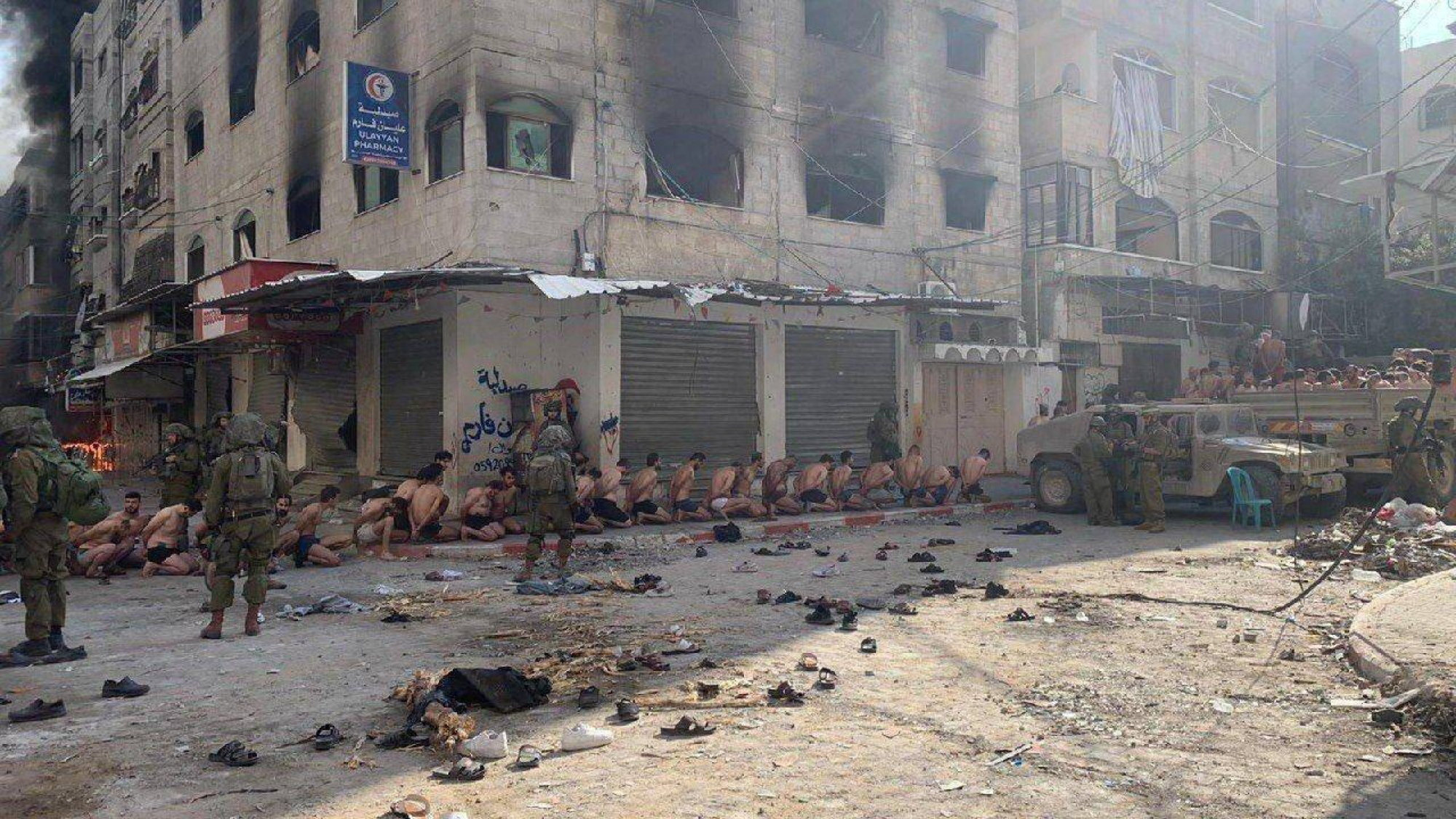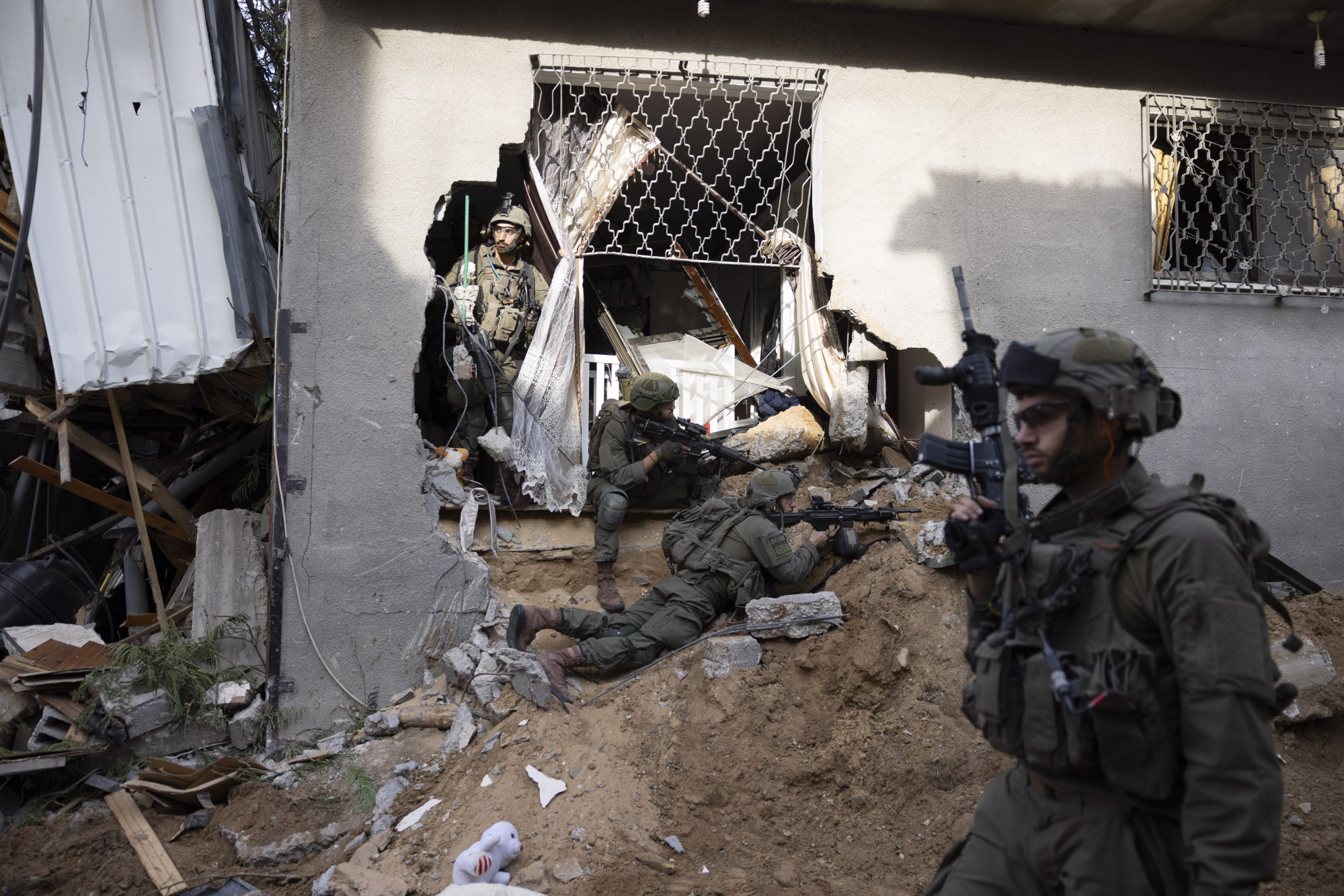“We were treated like cattle, they even wrote numbers on our hands,” said Ibrahim Lubbad, a 30-year-old computer engineer arrested in Beit Lahia on December 7 with a dozen other family members and held overnight. “We could feel their hatred.”
The round-ups have laid bare an emerging tactic in Israel’s ground offensive in Gaza, experts say, as the military seeks to solidify control in evacuated areas in the north and collect intelligence about Hamas operations nearly 10 weeks after the group’s deadly October 7 attack on southern Israel.
Militants killed about 1,200 people and abducted over 240 that day.
Videos of Israeli soldier behaviour in Gaza create headache for military
Videos of Israeli soldier behaviour in Gaza create headache for military
In response to questions about alleged mistreatment, the Israeli military said that detainees were “treated according to protocol” and were given enough food and water.
The army spokesman, Rear Admiral Daniel Hagari, said the men are questioned and then told to dress, and that in cases where this didn’t happen, the military would ensure it doesn’t occur again.
Those believed to have ties to Hamas are taken away for further interrogation, and dozens of Hamas members have been arrested so far, he said.
Photos and video showing Palestinian men kneeling in the streets, heads bowed and hands bound behind their backs, sparked outrage after spreading on social media.
To Palestinians, it is a stinging indignity. Among those rounded up were boys as young as 12 and men as old as 70, and they included civilians who lived ordinary lives before the war, according to interviews with 15 families of detainees.
“My only crime is not having enough money to flee to the south,” said Abu Adnan al-Kahlout, an unemployed 45-year-old with diabetes and high blood pressure in Beit Lahia.

He was detained December 8 and released after several hours when soldiers saw he was too faint and nauseated to be interrogated.
Israeli forces have detained at least 900 Palestinians in northern Gaza, estimated Ramy Abdu, founder of the Geneva-based Euro-Med Human Rights Monitor, which has worked to document the arrests.
Based on testimony it collected, the group presumes Israel is holding most detainees from Gaza at the Zikim military base just north of the enclave.
Israel-Gaza war: Islamic nations’ ceasefire focus ignores roots of the conflict
Israel-Gaza war: Islamic nations’ ceasefire focus ignores roots of the conflict
The Israeli military declined to comment on where the detainees were taken.
Palestinians cowered with their families for days as Israel poured heavy machine-gun fire into Beit Lahia and Jabilia, the firefights with Hamas militants stranding families in their homes without electricity, running water, fuel or communications and internet service.
“There are corpses all over the place, left out for three, four weeks because no one can reach them to bury them before the dogs eat them,” said Raji Sourani, a lawyer with the Palestinian Centre for Human Rights in Gaza.

He said he saw dozens of dead bodies as he made his way from Gaza City to the southern border with Egypt last week.
Palestinians recounted soldiers going door-to-door with dogs, using loudspeakers to call on families to come outside. In most cases, women and children are told to walk away to find shelter.
Some released detainees described enduring humiliating stretches of near-nudity as Israeli troops took the photos that later went viral. Some guessed they were driven several kilometres before being dumped in cold sand.
As Israel-Gaza war rages, keffiyeh scarves become a controversial symbol
As Israel-Gaza war rages, keffiyeh scarves become a controversial symbol
Released detainees said they were exposed to the chill of night and repeatedly questioned about Hamas activities that most couldn’t answer. Soldiers kicked sand in their faces and beat those who spoke out of turn.
Several Palestinians held for 24 hours or less said they had no food and were forced to share three 1.5-litre bottles with some 300 fellow detainees.
Darwish al-Ghabrawi, a 58-year-old principal at a UN school, fainted from dehydration. Mahmoud al-Madhoun, a 33-year-old shopkeeper, said the only moment that gave him hope was when soldiers released his son, realising he was just 12.
Returning home brought its own horrors. Israeli soldiers dropped detainees off after midnight without their clothes, phones or IDs near what appeared to be Gaza’s northern border with Israel, those released said, ordering them to walk through a landscape of destruction, tanks stationed along the road and snipers perched on roofs.
“It was a death sentence,” said Hassan Abu Shadkh, whose brothers, 43-year-old Ramadan and 18-year-old Bashar, and his 38-year-old cousin, Naseem Abu Shadkh, walked shoeless over jagged mounds of debris until their feet bled.
Naseem, a farmer in Beit Lahia, was shot and killed by an Israeli sniper as they made their way to a UN school in Beit Lahia, Abu Shadkh said. His brothers were forced to leave their cousin’s body in the middle of the road.
Israeli officials say they have reason to be suspicious of Palestinians remaining in northern Gaza, given that places like Jabilia and Shijaiyah, in eastern Gaza City, are well-known Hamas bastions.
Human rights groups say mass arrests should be investigated.
“Civilians must only be arrested for absolutely necessary and imperative reasons for security. It’s a very high threshold,” said Omar Shakir, Human Rights Watch’s regional director.

